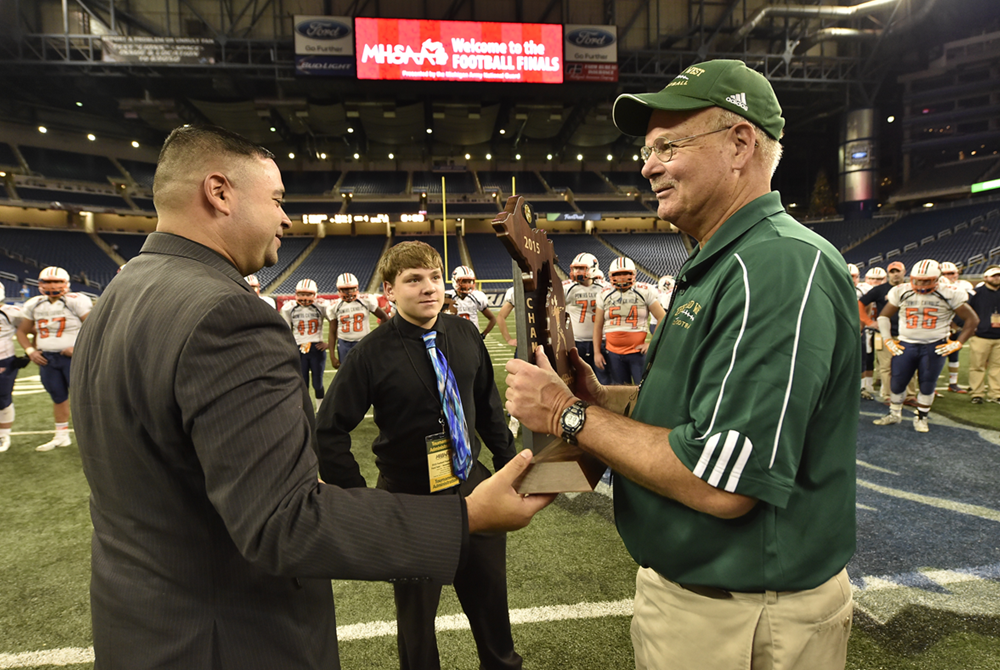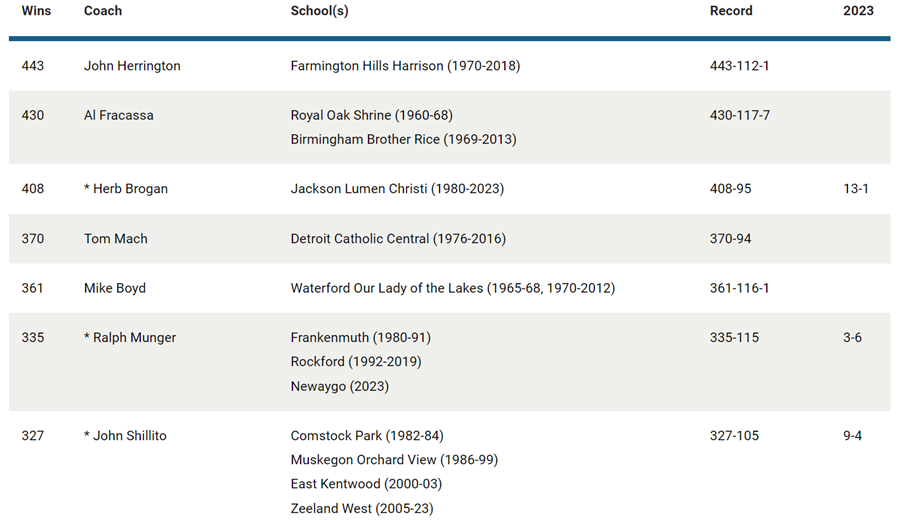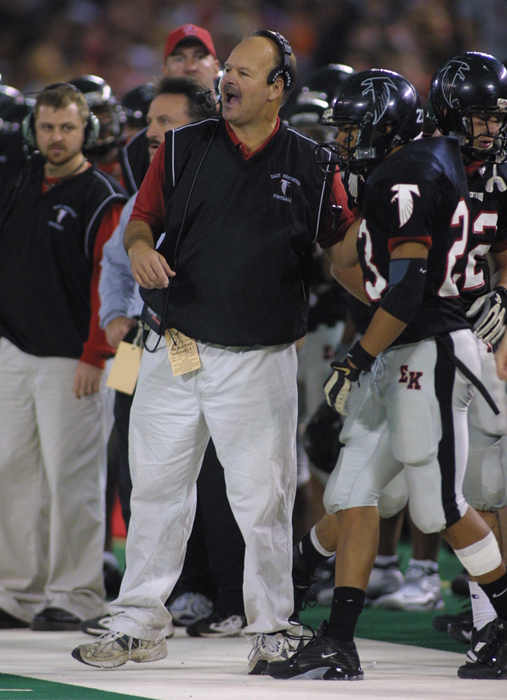
Writer-Turned-Coach Enjoys Debut
November 3, 2016
By Dennis Grall
Special for Second Half
ESCANABA — Sam Eggleston has seen high school football from two drastically different viewpoints. Now, even though he is an unpaid volunteer, he enjoys being on the sideline as a coach.
 Eggleston just completed his first season as a high school head coach, with Eben Superior Central winning its final three games to finish 4-5 in 8-player football. The Cougars were among the first teams in the state to join the 8-player format in 2010, their first year of football.
Eggleston just completed his first season as a high school head coach, with Eben Superior Central winning its final three games to finish 4-5 in 8-player football. The Cougars were among the first teams in the state to join the 8-player format in 2010, their first year of football.
Eggleston was a sportswriter before becoming a coach, giving him different perspectives to watching the same event.
The 1998 Rock Mid Peninsula High School graduate worked at newspapers in Escanaba, Kenai, Alaska; Northville and Novi, and Marquette before becoming a freelance writer and website blog editor in 2008. He started the writing phase of his career in 2000 with the Daily Press in Escanaba, under my direction.
He served as a volunteer assistant football coach in Northville, then moved back to the Upper Peninsula and became a volunteer coach at his alma mater in 2011 when the Wolverines went to 8-player football. He joined Superior Central in 2014 and spent two seasons as a volunteer aide until landing the head job just two weeks before the 2016 preseason began.
“In both careers … you took a shot on me and I ran with it, and the same with coaching; they gave me a shot and I’ve run with it as best I can,” he said.
In addition to his unpaid position at Superior Central, in rural Alger County, Eggleston is responsible for fundraising for the self-funded football program, a major priority for his offseason.
“My coaching is over (for the season) now and the majority of my time will be spent on raising funds so we can get new helmets, get new pads to replace ones that are broke, spending money we don’t have so we’ve got to make that up now,” he said. “We have to win now to have successful fundraisers.”
As a sportswriter, Eggleston would simply switch gears and move on to coverage of the next athletic season, for instance once fall sports moved into winter. He also never had to worry about how coaches managed off-field X’s and O’s once their seasons concluded.
Life was totally different as a reporter. “I had a different approach, different viewpoint, different mindset to a game as a writer,” said Eggleston, who still has the heft of when he was a lineman but now looks like a lumberjack with his bushy beard and build.
“Now I have to worry about every kid and every position,” he said. “Sometimes I don’t even see the end result of the play because I’m watching the line play. I don’t even know how well my running back did until I see where they moved the stick.”
He may also be working on an injured player while the game goes on, trying to make play calls and other decisions at the same time.
As a sportswriter, he would be jotting down notes between plays or perhaps checking the result of a picture he took of the previous snap, totally unaware the coach was monitoring several assignments.
“I look back at the writer I was and as a coach now, and I would hate the type of writer I was,” he said.
Eggleston would analyze why a coach would switch to running a sweep rather than the counter that had been working, all while the coach may be working on an injured player that caused a change in offensive plans.
“As a writer I never had the insight to see everything. I just saw the overall game and kept track of every yard,” he said. “As a coach I can’t even tell if the play went five yards because I have three plays stacked up as the game goes on.”
While he was writing sports in the metro Detroit area, his weekly paper often covered games also being covered by the Detroit Free Press or the Oakland Press, with those stories appearing the next day. Eggleston’s story would appear maybe five days later, after everyone knew what happened.
 “I had to come in with a different angle. I tried to be a little more analytical and focus on strategy versus the flourish and try to get the meat of the game rather than get to the flowery parts,” he recalled. “I tried to take a different approach and make my stuff more interesting.”
“I had to come in with a different angle. I tried to be a little more analytical and focus on strategy versus the flourish and try to get the meat of the game rather than get to the flowery parts,” he recalled. “I tried to take a different approach and make my stuff more interesting.”
His style apparently worked as the paper received several journalism awards and subscriptions remained strong.
Writing also provided some interesting backdrops. He had to use small charter planes to see some games in Alaska, or get to Nome to handle features about the Iditarod sled dog race.
He recalls covering a high school hockey game on an outdoor rink in Alaska and said “it was the first time I saw wind shear affect a hockey game.”
Eggleston also covered a football game where a kicker booted the ball off the uprights, then off a fence, and it bounced into the ocean in Homer.
He reported on a murder trial at that paper, where he would work the news desk in the morning, take time off and then handle sports at night. “It was super stressful,” he said.
Now walking the sidelines as a coach, he said “it definitely does feel like I’ve seen both sides of the coin, and I understand both sides of them better.”
He remembers just giving “little more rounded answers and (to) give both sides of the story” in postgame interviews. “A lot of coaches give canned answers. I try to be a little more in-depth and help try to write the story.”
In his early days as a sportswriter, he said “I would see the game unfold and see the pressures and why a coach would make a decision to go for it (on fourth down). I was a bit more critical of the coach and their decision,” he said, adding “I would probably have been a little more biting about it when I wrote the story.”
He admits in those days “I thought I knew everything there was to know about football. I played it,” he said. “I always approached the game like I was the professional and knew everything about the game. Now as a coach there are a host of responsibilities during every game. I am in completely different waters now. The hardest thing is keeping the kids pointed in the right direction as things go wrong.
“You’ve got the entire team and you’ve got to keep moving in a positive direction, keep the focus going forward. Forget the last play and work on the next one and get the kids to buy into that philosophy.”
He also compares his first writing assignment at the Daily Press with his first game this season at Ontonagon. “I did a (men’s baseball) story about the Escanaba Polecats, and you read my first line and said, ‘Did Yoda write this?’ I thought, oh my God, I don’t know what I’m doing.”
The Cougars lost their opener this fall 36-8, and Eggleston said “after being an assistant for four years, I still wasn’t prepared going into that Ontonagon game. We lost, and as I look back, if we played them right now I think we would beat them.
“I had no clue coming into that first game and didn’t have any idea how to get us back on track.”
He eventually figured enough out to finish 4-5 and found plenty of ways to enjoy being a coach.
Eggleston tries to eat lunch with his players every day, and he pays for his own meal.
“I want a family environment there; we all sit at the same table,” he said. “What I get back is relationships I never had before. I feel like I have 21 kids, and I love every minute of it.”
 Denny Grall retired in 2012 after 39 years at the Escanaba Daily Press and four at the Green Bay Press-Gazette, plus 15 months for WLST radio in Escanaba; he served as the Daily Press sports editor from 1970-80 and again from 1984-2012. Grall was inducted into the Upper Peninsula Sports Hall of Fame in 2002 and serves as its executive secretary. E-mail him at [email protected] with story ideas for the Upper Peninsula.
Denny Grall retired in 2012 after 39 years at the Escanaba Daily Press and four at the Green Bay Press-Gazette, plus 15 months for WLST radio in Escanaba; he served as the Daily Press sports editor from 1970-80 and again from 1984-2012. Grall was inducted into the Upper Peninsula Sports Hall of Fame in 2002 and serves as its executive secretary. E-mail him at [email protected] with story ideas for the Upper Peninsula.
PHOTOS: (Top) Eben Junction Superior Central football coach Sam Eggleston speaks with some of his players during a game this season. (Middle) Eggleston monitors the action on the field. (Photos by Dennis Grall.)

Process, Relationships Still Matter Most as 4-Time Champ Shillito Coaches 41st Season
By
Steve Vedder
Special for MHSAA.com
October 18, 2024
It was John Shillito's third year as Muskegon Orchard View football coach, and while the wolves weren't exactly knocking at the door, some faint low growls could clearly be heard.
Shillito had been successful at Comstock Park with his teams going 21-8 over three seasons, but the move to Orchard View included 3-6 and 4-5 records the first two.
While there wasn't yet widespread anxiety, Shillito recalls there was a bit of concern.
"I was much younger then and wasn't as successful yet in education," Shillito said. "But we weathered it and came through the other side. But you wonder a little; there's always a little self-doubt. I think it was important to go through it, because you can learn as much even when you're not winning."
Michigan high school football is the better for Shillito sticking it out. Two schools later, Shillito finds himself as the state's third winningest active coach and seventh overall with a 333-106 mark over 41 seasons.
His Zeeland West team is 6-1 this season and likely to become his 27th team – and 15th in a row – to qualify for the playoffs. Shillito's teams at Byron Center, Muskegon Orchard View, East Kentwood and Zeeland West have won a combined 16 conference titles.
Not bad for someone whose first love was baseball. Shillito's father, Harry, played three seasons professionally in the Brooklyn Dodgers system during the "Boys of Summer" era of the 1940s and 50s. Shillito grew up as a talented catcher in the spring and top football prospect as a defensive lineman in football. When programs such as Central Michigan, Eastern Michigan and Northern Michigan began showing an interest, the lure of a football scholarship made it an easy decision which sport he would follow.
After playing three years at Central Michigan, his coaching career kicked off with an assistant gig at Central Bucks East in Pennsylvania in 1980. He became head coach at Comstock Park in 1982.
 Shillito said the same motivation which drove him into coaching has kept him in the sport for nearly five decades. It's not necessarily winning state championships – he’s won four at Zeeland West – or fulfilling a deep competitive drive or even the lure of Friday Night Lights in a small community. It's showing up at practices, adhering to a process and building and honing relationships with players and other coaches.
Shillito said the same motivation which drove him into coaching has kept him in the sport for nearly five decades. It's not necessarily winning state championships – he’s won four at Zeeland West – or fulfilling a deep competitive drive or even the lure of Friday Night Lights in a small community. It's showing up at practices, adhering to a process and building and honing relationships with players and other coaches.
Take those away and the 67-year-old Shillito, a member of the Michigan High School Football Coaches Association Hall of Fame, would definitely be looking elsewhere to spend Friday nights in the fall.
"It's the process; I love a good practice. You know when (it's good) and when it isn't. More than even the football, it's the coaching process and the people I work with," he said.
"Winning is a week-to-week deal. This week's game is what we're all about. And then in the offseason, it's preparation for the year coming up. The state titles are always a bonus."
Which isn't to say Shillito isn't competitive. Whether it’s been playing hockey, wiffle ball, 3-on-3 basketball or backyard football with his brothers, Shillito's competitive spirit has thrived.
"Oh yeah," he said. "But I'm a glass half full-type competitor. I can find the positive side in either wins or losses. But for me it's about the preparation, no doubt about it."
Shillito's success has come even with opponents knowing exactly what they'll see offensively from his teams: the famed wing-T offense, which he's run since the mid-1990s and was taught to him by famed West Michigan coach Irv Sigler. In fact, Shillito said if there is anything responsible for his success, it's the ability to implement what he's learned from coaches as a whole such as Mike Henry, the longtime basketball coach at Orchard View, or former Remus Chippewa Hills football coach Ron Reardon.
When he first got into coaching, Shillito said the wing-T seemed the easiest to teach. He's tweaked the process over the years, but it's been highly successful for him wherever he's coached. The number of Michigan teams which run the wing-T has probably lessened over the years as passing has taken over many high school offenses. But Shillito said the run-first philosophy can still be found in pockets all over the state. Shillito said he has no second thoughts about devoting his offense to the wing-T, and the success only underscores the point.
"It can be difficult if you're not winning, no doubt about it," said Shillito, who figures he's coached about three dozen 1,000-yard rushers. "But the value in the system is that it's an easier process. That is, if you get a buy-in from the players and community. We've had that at Zeeland West."
 As the sun begins to set on Shillito's coaching career, he's hard-pressed to pick his best, favorite or most surprising teams. For starters, there's the 1983 Byron Center team which reached the Class C Semifinals, or the 1995 and 1999 Orchard View teams which played in Class B Finals and combined for a 24-3 mark.
As the sun begins to set on Shillito's coaching career, he's hard-pressed to pick his best, favorite or most surprising teams. For starters, there's the 1983 Byron Center team which reached the Class C Semifinals, or the 1995 and 1999 Orchard View teams which played in Class B Finals and combined for a 24-3 mark.
Or maybe the 13-1 Division 1 runner-up club at East Kentwood in 2002, and the 2006 Zeeland West team which claimed the Division 4 title after winning its last 11 games by an average of 35 points per. Or the 2011 Zeeland West team which went 14-0 to kick off a phenomenal five-year stretch during which the Dux went a combined 60-6.
Ask Shillito about any of those seasons, and his answer as to what he remembers most about his coaching career may be surprising. Many of his most cherished moments include his teams going just 5-6 over the years against Muskegon, including three playoff losses that ended the Dux's season. Balance that with his record against other programs, such as a 73-16 mark against other Lakeshore teams, including an 18-7 record against rival Zeeland East. Or a 10-4 record against traditional Grand Rapids-area powers such as Lowell, Grand Rapids Catholic Central, South Christian, West Catholic and Hudsonville. In the postseason, Shillito's teams are an amazing 54-22 over 26 seasons in the MHSAA Playoffs.
As for knocking heads with Muskegon, Shillito said the thrill of a great rivalry and the consistency his teams have shown over the years is what has always driven him.
"It's the longevity and consistency," Shillito said. "I've gotten to work with great people who have had an equal share in this. I've had such a wide variety of guys I've worked with in four programs, and it’s meaningful. "
He is coy on when he might finally call it a career. He could wake up tomorrow and decide it's the time, or it could be next week, the end of the season or maybe one more season. Who's to say?
"We're getting close now," he will say. "We're always in the moment; that's just where we are. Then we'll evaluate things after the season. That's been true now for several seasons."
PHOTOS (Top) Zeeland West football coach John Shillito, right, receives the Division 4 championship trophy from MHSAA Representative Council member Orlando Medina in 2015 at Ford Field. (Middle) Entering this season, Shillito ranked seventh all-time and third among active coaches for football victories in the MHSAA record book. (Below) Shillito prepares to send in one of his East Kentwood players during the 2002 Division 1 Final at Pontiac Silverdome. (MHSAA file photos.)

